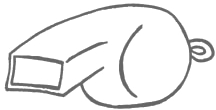

Background Information
In 1863, the United States Congress passed the False Claims Act, a piece of legislation designed to protect those who came forward to report fraudulent actions by Civil War equipment suppliers. With this act, the notion of whistleblowing was formalized, recognizing the value of encouraging individuals to come forward and expose problems within corporations and government agencies. Almost a century and a half later, WikiLeaks moved the concept of whistleblowing into an age of online media and internet culture, using the web to expose secret information on a new scale.
What is Whistleblowing?
First used formally in the 1950’s, the term “whistleblower” denotes an individual who publicly exposes some unsavory practice on the part of their employer. While the origin of the word is not entirely clear, it likely derives from the metaphor of a referee, policeman, or other such mediator blowing on a whistle to signal that an illegal action has taken place. An expanded definition also recognizes “external whistleblowers”, such as media agencies and watchdog groups, who seek to expose illegal action in other organizations. As we will discuss here, WikiLeaks represents one such external whistleblower, although it frequently makes use of internal whistleblowers to accomplish its goals.
Whistleblowing is generally regarded as a valuable contribution to transparency and accountability within U.S. society, and many notable whistleblowers such as Daniel Ellsberg and W. Mark Felt have been widely celebrated for their actions. However, retribution against whistleblowers is also a common occurrence, with many individuals being forced out of their jobs or otherwise ostracized. While whistleblowers may have some protection under the law, this protection is not always sufficient to prevent their lives from being adversely affected by their decision to come forward. In the case of external whistleblowers such as WikiLeaks, this retribution can take the form of legal action or economic sanctions against the leaking organization.
What is WikiLeaks?
Founded in 2006, WikiLeaks is a non-profit organization and website dedicated to exposing secret information, primarily centered around the actions of government entities. It has gained notoriety largely due to its publication of documents relating to the United States’ involvement in Iraq and Afghanistan, including a video depicting civilian casualties during an airstrike, the Afghan War Diary, and the Iraq War Logs. WikiLeaks’ public persona is represented by Julian Assange, the editor in chief. Assange has received numerous commendations and awards while also being the target of multiple legal prosecutions, including a recent accusation of sexual assault. He has consistently served as the face of WikiLeaks, speaking frequently on freedom of information and transparency throughout the world.
WikiLeaks’ motivation stems from a desire to expose wrongdoing in oppressive governments across the world, but has expanded to include advocacy and enforcement of general government transparency and openness. This is accomplished through technical and social exploitation of government systems to obtain access to restricted materials. These materials are then hosted on WikiLeaks’ own website and shared with a number of print media partners, including El País in Spain, Le Monde in France, Der Spiegel in Germany, The Guardian in the United Kingdom, and The New York Times in the United States. While WikiLeaks’ website has been the target of numerous attacks and legal actions, the organization maintains an array of mirror websites that replicate its content and ensure wide accessibility. WikiLeaks funds these efforts primarily through individual monetary contributions, soliciting donations from the general public on its website.